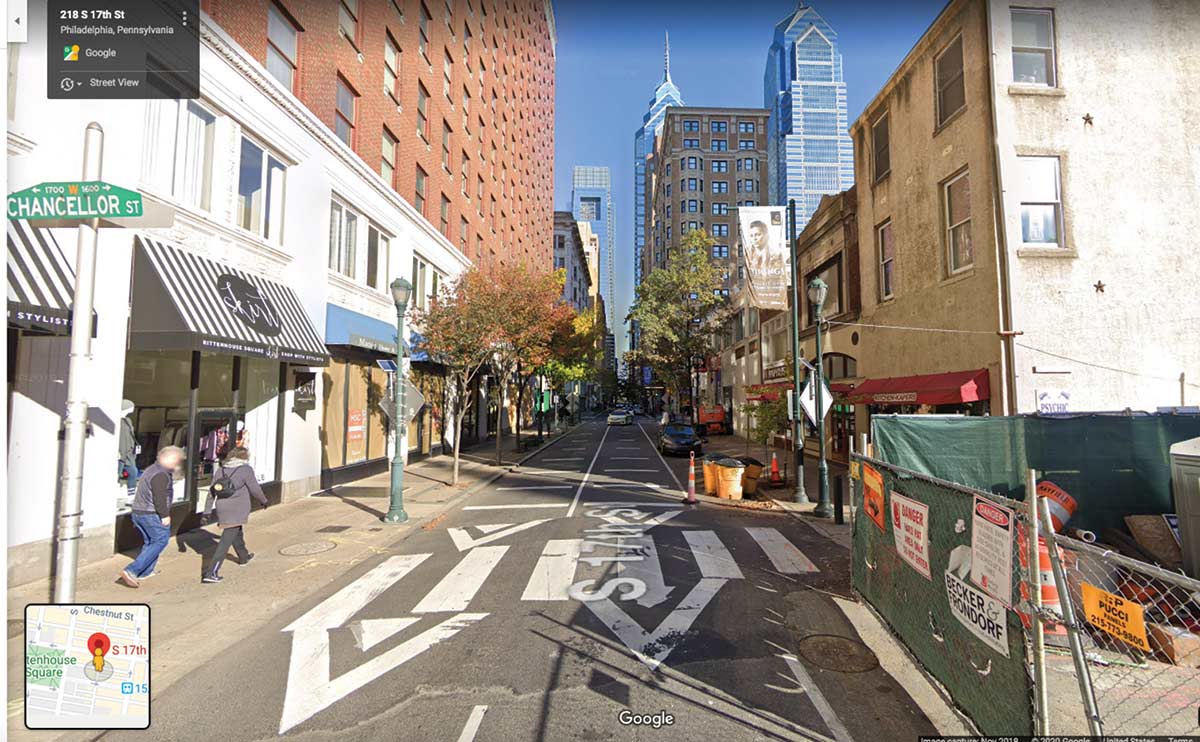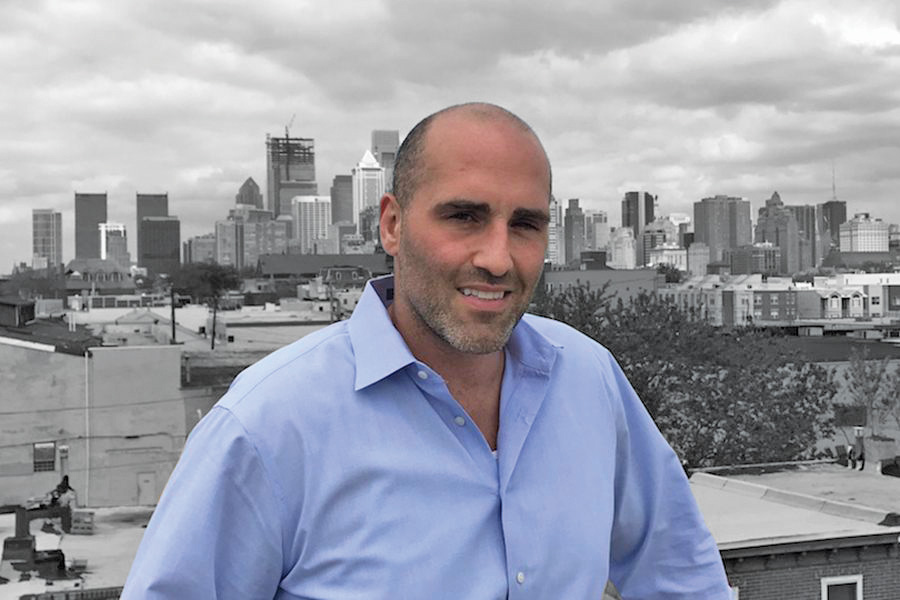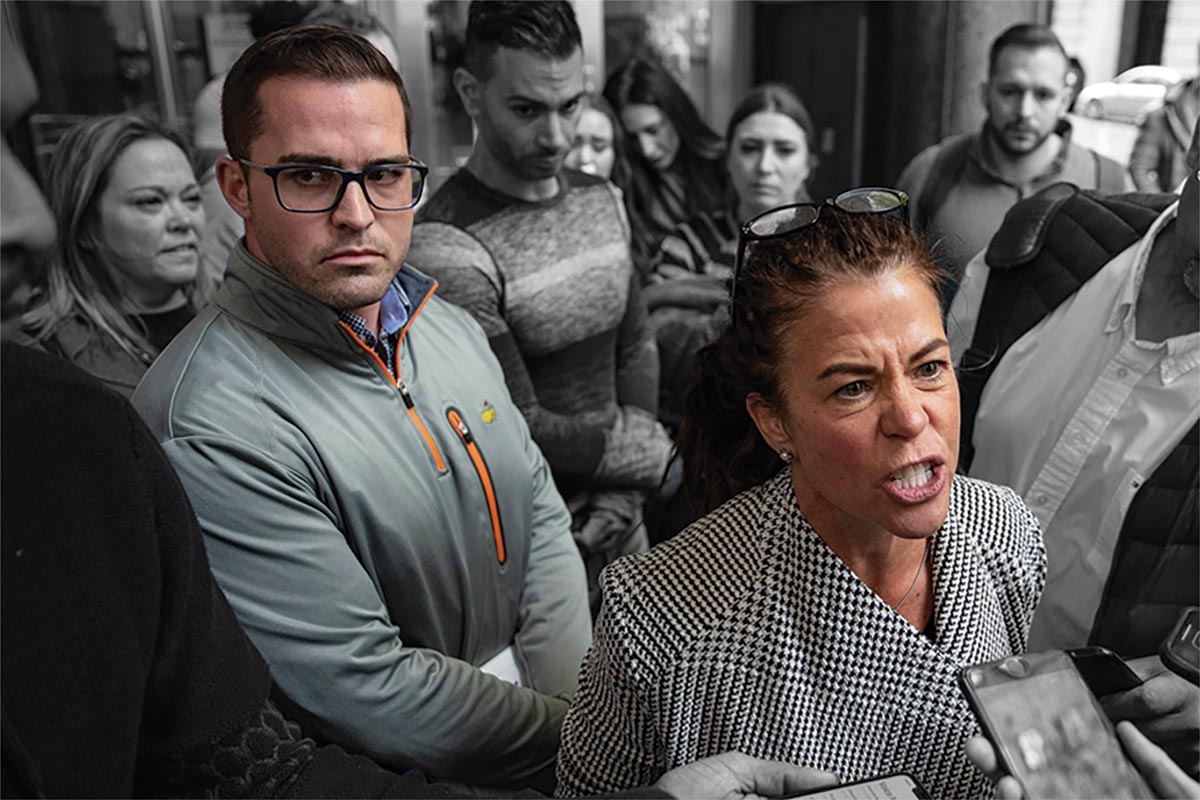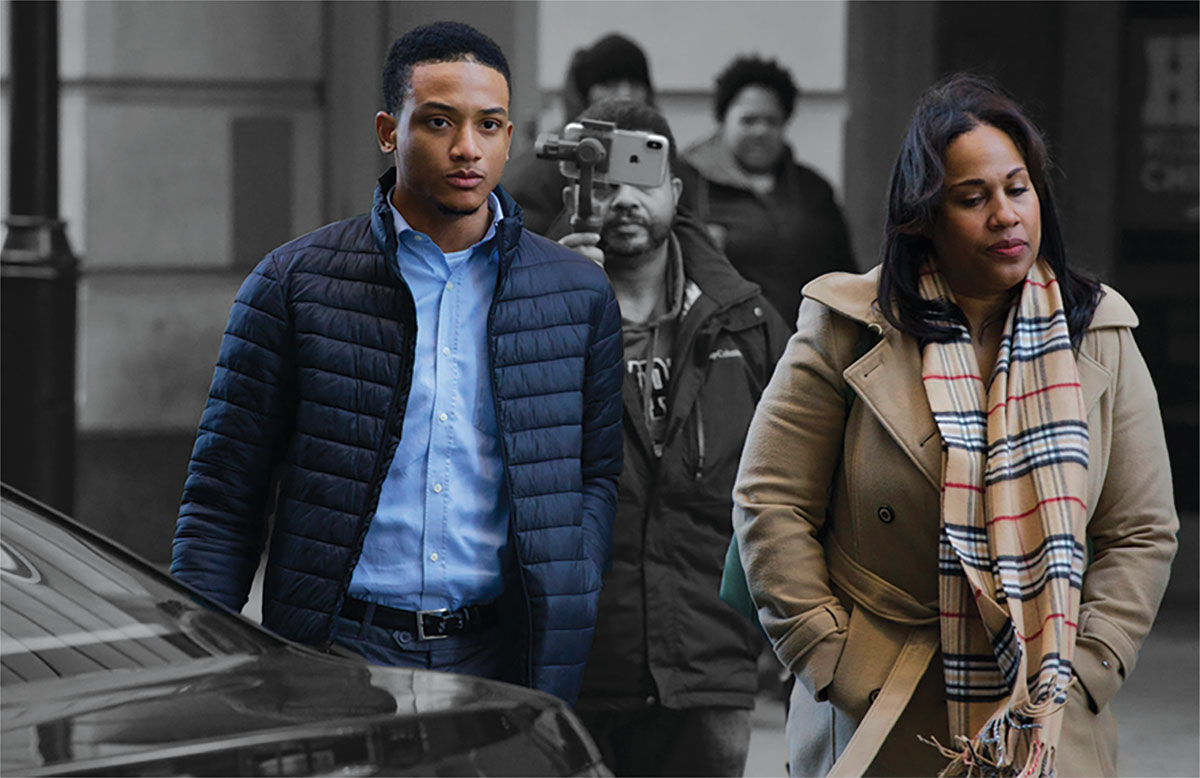Philadelphia—Michael White, a 20-year-old Uber Eats courier, was riding his bicycle along the intersection of 17th and Chancellor here when he came upon three men in a Mercedes-Benz shouting at a fellow courier. When White attempted to intervene, the other courier fled, leaving White as the target of the three men’s anger. One of them, Sean Schellenger, a 37-year-old real estate developer, chased him into an alley; after a scuffle, White emerged with a knife covered in Schellenger’s blood. Schellenger was pronounced dead at Thomas Jefferson University hospital on July 12, 2018, at 11:21 pm.
White surrendered to the police 16 hours later and was charged with first-degree murder and possession of an instrument of crime. According to the initial police accounts, a traffic tie-up involving another car prompted Schellenger and the two other men to get out of their vehicle to try to clear the jam. When White arrived at the scene, he and Schellenger exchanged words that led to an altercation, and White pulled out a 6-inch knife and stabbed Schellenger once in the back. White’s defense team was adamant that he acted in self-defense after a drunken Schellenger violently confronted him. With a poor black defendant and a wealthy white victim, we know how this story ends. Only this one didn’t turn out that way.
Instead, White received the kind of legal justice that too many young black men have historically been denied. There are countless statistics and cases that highlight what happens when America’s criminal justice system disproportionately stops, frisks, sentences, and incarcerates black people. According to a 2018 United Nations report from the Sentencing Project on racial disparities in the US criminal justice system, prosecutors are more likely to charge people of color with crimes that carry heavy sentences than they are white people. Black youths are incarcerated at over four times the rate of white youths in the country, and African Americans overall are imprisoned at more than five times the rate of white people—a climb from statistics compiled at the beginning of the century.
Behind the statistics of institutional failure lie casualties like 15-year-old Jaquin Thomas, who was found dead in an adult correctional facility; 17-year-old Uniece “Niecey” Fennell, who committed suicide in a North Carolina detention center while waiting to be tried as an adult; and Kalief Browder, who killed himself after spending three years at New York City’s Rikers Island jail complex, charged with stealing a backpack at age 16. What made White’s encounter with the criminal justice system turn out differently?
Popular
"swipe left below to view more authors"Swipe →
Michael White has been trying to catch a break his whole life. His family life was shattered when he was 12 years old after his father was sent to prison for over 20 years. “It didn’t help to sometimes be living homeless and having to move from place to place,” White says. “It was rough, but I always just tried to stay positive.”
Poetry and music were his therapy as he struggled to find a way out. In 2015, White joined the Philly Youth Poetry Movement slam team, helping the group make it to the semifinals of a national competition, placing fifth in the overall rankings. During this time, he performed historical narratives involving enslaved black people and poems invoking the experiences of his childhood.
“It was an amazing time performing alongside him,” says Jamal Parker, White’s poetry slam teammate. “Mike instantly connected with other youth poets in the competition, based on his charisma and kindness alone. He was known as someone who was willing to commit to team effort, no matter the circumstances.”
White’s talent in poetry slam competitions and as a student at the Academy at Palumbo, a college preparatory magnet high school, led to his getting accepted to Morgan State University in Baltimore.
But just as White was beginning his freshman year, he found out that his father had been incarcerated for sexually abusing and impregnating White’s older teenage sister. The exposure of this long-buried secret devastated White, he says, sending him into a “spiral of depression.”
“I flunked out of my first year of college. I was taking drugs to cope and just couldn’t stay focused,” he says. White eventually returned to Philadelphia and struggled to find work. Although he took a leave from college, he says, he had every intention of returning to Morgan State once he had gotten his life back on track. Instead he found himself “caught up in the system” for things he describes as “reactionary.” According to court records, he was charged in November 2017 with possession of marijuana, theft, receiving stolen property, possession of an instrument of crime with intent to employ it criminally, and conspiracy. In January 2018, although he had no criminal convictions, he was entered into the city’s Accelerated Misdemeanor Program and was ordered to complete community service.
“I was just doing dumb stuff to survive,” White says. “I just wanted to do anything that would help me get back to college and connect with my best friend, who kept encouraging me to not give up.”
That friend was 19-year-old Jonathan Tobash, a fellow student White met during his freshman year. “We instantly clicked the moment he heard one of my raps,” White recalls. “He was from the east side of Baltimore, and I was from South Philly. We both were trying to make it out and make something of ourselves.”
Tobash, an industrial engineering major, had many things in common with White—growing up in the rough patches of his city, getting accepted into a prestigious magnet school, and having a deep love for hip-hop music and basketball.
In December 2017, White got a text from friends at Morgan State saying that Tobash had been shot and killed during a robbery attempt outside a convenience store in northeastern Baltimore.
“That broke me,” White says. “We kept in touch the entire time I was away. He knew everything I was doing to try to make it back to school, and he never judged me or anything like that. I was so angry that someone took his life.”
Saddened by the loss, White helped raise money for his friend’s funeral through a GoFundMe campaign. Yet White couldn’t attend Tobash’s funeral in Baltimore, since he had been advised not to leave the state because of his legal situation at the time. It didn’t help that he could not afford to travel, and he gave what little funds he had to the crowdfunding account for Tobash’s burial instead.
“That was one thing that I couldn’t take back,” White says. “I felt like a failure for getting so caught up in my own shit that I couldn’t be there for my own friend.”
White eventually landed a steady job with Uber Eats, biking through various parts of Philadelphia. He says he considered this type of work “easy money” and “nothing memorable,” until the night of July 12, 2018.
“I was delivering on my bike that evening,” White recalls. “Everything just felt all too well until it wasn’t.”
White was delivering a Popeyes order to an address near Rittenhouse Square, an affluent neighborhood in downtown Philadelphia. En route to the location, White says, he encountered three white men in a Mercedes-Benz impatiently shouting at a black man, a fellow deliveryman, as his car was parked in their way.
“I overhear a white man in that car refer to this man as a nigger out loud in public,” White says. “They were clearly drunk and loud, and I wanted to make sure he was all right.”
According to White, tensions escalated when one of the men from the car approached the man being shouted at. (Police were never able to identify the other deliveryman.) White says the man who got out of the car was Schellenger.
“Schellenger confronted this guy, and I spoke up, telling him that he didn’t have to be a tough guy,” White says. “The black delivery guy quickly left, and I was headed to my bike. That’s when things took a turn for the worse.”
White says Schellenger drunkenly approached him and began to yell at him. (Autopsy reports showed that Schellenger’s blood alcohol level was 0.199, more than twice the legal driving limit.) As White headed back toward his bike to leave, he says, Schellenger threatened to “beat the black off” him.
“At that point, I was too far from my bike to just run off,” says White. “I pulled out my knife that I carried for safety on the job and began to tell him to back up as I was trying to walk away from him. He kept coming towards me until we landed in a nearby alley.” (Silent video footage of the confrontation that was shown during the trial but not to the public confirms White’s account that Schellenger continued to approach him before the incident escalated to violence.)
What happened next had White “fighting for my life,” he says. “Schellenger held me up in a wrestler-like body-slamming position, and I couldn’t even feel my weight off the ground. I just tried to hold him off me, but I couldn’t feel anything. Once his attempt to slam me on the ground failed, I saw that he landed on the knife as he flipped over.”
Covered in blood from retrieving the knife, White ran down the street, begged money from strangers, then headed home on a trolley. It was now close to midnight, and he says he was too scared to return to get his bike, for fear of being arrested.
“I saw my entire life flashing past my eyes as if it were over,” White says. “I just thought that if the police found me, they would not believe I was acting in self-defense because it involved a rich white man in Rittenhouse.”
Before he got home, White says, he threw the knife over the roof of a nearby apartment building. The following day he turned himself in to authorities. He spent nearly a month behind bars until local activists raised money to cover his bail. He was initially charged with first-degree murder, but that was quickly reduced to third-degree murder. He was assigned three white men as his public defenders. Then Keir Bradford-Grey entered his life.
“He could have been my son,” Bradford-Grey says of the first time she met White, when he was out on bail and had just started working at a coffee shop. “I saw the innocence in his eyes and the pain of a young black man who felt helpless.”
Although she’d served as chief public defender in neighboring Montgomery County for four years and in Philadelphia for four years, Bradford-Grey had never worked on a homicide case before. It had been seven years since she’d tried any case before a jury. She says many of her colleagues questioned her decision to “risk it all” for a defendant they “didn’t believe had a fighting chance.”
Their appraisal may have been based on local media coverage, which inflamed passions surrounding the case. Conservative commentators took jabs at newly elected District Attorney Larry Krasner’s office for reducing White’s charge. Black and brown community activists used the hashtag #FreeMikeWhite and held rallies calling for his immediate release and acquittal. Local news shows often used the mug shot of White alongside photos of Schellenger smiling, with some reporters framing the incident as the “Rittenhouse stabbing” and Schellenger as a “stabbing victim.”
For example, a Fox News segment with conservative host Tucker Carlson in November 2019 described Krasner as “[George] Soros–backed” and White as a “killer” and featured Linda Schellenger, Sean Schellenger’s mother, as a guest who criticized Krasner’s decision to reduce White’s charge. She described Krasner as a “rogue DA” who has “gone on a power trip to take this into craziness.”
“It’s literally frightening,” she told Carlson.
“The media did do their white privilege thing quite a bit,” says Philadelphia attorney, journalist, and civil rights activist Michael Coard. “While death in such situations is always tragic, I’ve never seen local media extending the privilege of humanity to black folks who are killed in similar situations.”
He points out that White’s previous legal woes were often used in media stories about him, while “the media rarely, if ever, delved into the fact that Schellenger had three arrests,” Coard says. “Everything about this case wasn’t typical. In fact, it’s actually an aberration.”
“Several lawyers didn’t believe Mike could win because they had become cynical [about] the system altogether due to racial bias,” Bradford-Grey says. “But this wasn’t about my reputation. This was about justice. After reviewing the facts of the case, I had faith that we could prove his innocence.”
One important factor that helped shape the outcome was that Bradford-Grey was able to make her case to Krasner, one of the first of a growing movement of progressive district attorneys. She says that after showing Krasner her investigative findings in the case, he lowered the murder charge to voluntary manslaughter right before the trial in October of 2019. Like Kim Foxx in Chicago, Chesa Boudin in San Francisco, and Wesley Bell in Ferguson, Missouri, Krasner is part of a wave of progressive prosecutors elected on promises to end mass incarceration, decriminalize marijuana possession, dramatically reform the cash bail system, and end the death penalty.
“Keir provided information that her public defender’s office independently collected that was useful in helping my office reconsider White’s murder charge,” says Krasner. Among the facts unearthed by Bradford-Grey was Sean Schellenger’s criminal record: He had a 2008 arrest in Florida for battery and resisting detention, although the charges were later dropped. In Pennsylvania’s Chester County he’d also been found guilty of disorderly conduct in 2009 and had been charged with burglary, resisting arrest, criminal trespassing, and theft in 2001.
“The final decision was up to me in reducing White’s charge to manslaughter, and that was due in part to reviewing new information that was being given to us,” the DA told me.
Krasner, who served as a defense attorney for over 30 years, described White’s case as “extraordinary.”
“I saw video footage of the confrontation between White and Schellenger over 20 times,” Krasner says. “Although the clip was silent, a great deal of White’s account when we questioned him corroborated what he described that night as an act of self-defense. My office eventually charged him with manslaughter because we felt that White’s actions were those of imperfect self-defense, based on his use of the knife and other factors.”
Another factor that helped White’s case was the financial support given to the Defender Association of Philadelphia. Last summer the Philadelphia City Council voted to increase the budget for the taxpayer-funded organization.
“With more funding, we were able to hire more experts, send attorneys out of state to conduct interviews, and facilitate mock jury trials to prepare Mike,” Bradford-Gray says. “This case reignited my optimism in the legal system because it showed that working-class people don’t have to go into debt in order to seek justice.”
The defense strategy of humanizing Michael White paid off. On October 17, 2019, he was found not guilty of voluntary manslaughter but was convicted of one misdemeanor count of tampering with evidence, involving his disposal of the knife. He was cleared of all other charges. On January 9, 2020, White was sentenced to two years’ probation, with no jail time.
“What people have to understand,” Krasner says, “is that when a jury finds one not guilty of manslaughter, that means they had an overwhelming reasonable doubt—more than just 51 percent—which essentially shows that the public defender’s office defended White well. I think all of those involved in this case worked their hardest to remain fair and seek justice.”
While the verdict was a huge relief to White and his supporters, not everyone in Philadelphia celebrated. Conservative commentators and leaders criticized Krasner’s role in reducing White’s sentencing in local and national publications.
“Krasner’s outrageous undercharging of Michael White once again raises the troubling questions of whose side is he on, and how much longer can Philadelphia afford to have a district attorney who proudly describes himself as a ‘public defender with power’?” wrote former federal and state prosecutor George Parry in an op-ed for The Philadelphia Inquirer published a week before White was sentenced.
“Larry Krasner said he wouldn’t prosecute certain offenses and the bad guys got the message,” wrote Republican activist Jennifer Stefano in a Wall Street Journal op-ed published a day after White’s sentencing. “Mr. Krasner considers himself a reformer, but social justice is no substitute for criminal justice.”
“Our life sentence began on July 12, 2018 when Sean was fatally stabbed with a deadly weapon,” wrote Linda Schellenger in a statement. “The sentencing is, hopefully, the last episode in Krasner’s finely orchestrated obstruction of justice. We have endured enough pain at the hands of The Killer, The DA and Bradford-Grey. Sean Schellenger was intelligent, articulate, successful and kind and no one can ever take those qualities away from him or us!”
Still, the backlash against Krasner has been minor compared with the campaign against Kim Foxx, whose controversial handling of the bizarre case involving Empire actor Jussie Smollett threatens her reelection. “I’m not bothered by conservative critics that resort to Trump talking points as an attempt to dismiss the important work being done right now in my office,” Krasner says. “As far as my thoughts on the Schellenger family, I have no comment in regards to the remarks they have said about me in the press. I have spoken to Linda several times and can understand the pain she is going through at this time in response to the trauma.”
While the political divisions exposed by the trial are still playing out in the press, White remains focused on getting his life back together—considering a return to college, homing in on his poetry and musical interests, and taking some time to reflect on the past two years.
“As I strive to move forward with my life, I will never forget that an unfortunate incident led to the death of a man who meant something to his family and friends,” White says. “I have gone past that alley in Rittenhouse a few times to pay my respects. Sean lost his life, and I lost some of myself there as well. The only thing I can do now is take this second chance that justice has finally granted me to be better. That’s all I can do.”






